高中英语必修二第三单元知识点总结
2019新人教版高中英语必修2Unit3单元重点知识点归纳总结(因特网单元小结)
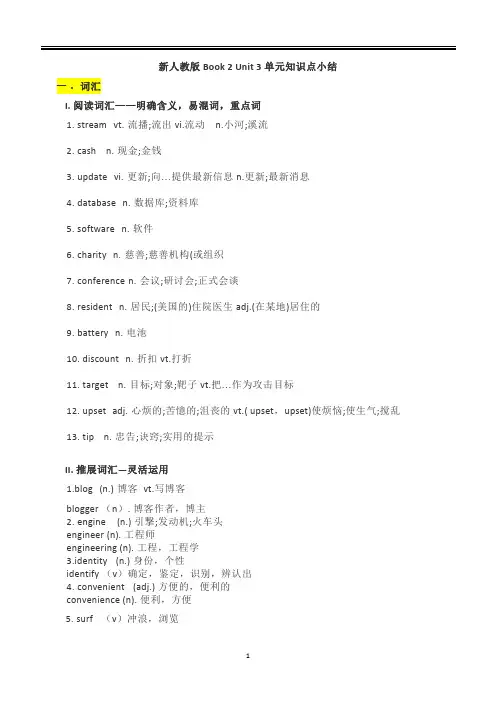
新人教版Book 2 Unit 3单元知识点小结一.词汇I. 阅读词汇——明确含义,易混词,重点词1.stream vt.流播;流出vi.流动n.小河;溪流2.cash n.现金;金钱3.update vi.更新;向…提供最新信息n.更新;最新消息4.database n.数据库;资料库5.software n.软件6.charity n.慈善;慈善机构(或组织7.conference n.会议;研讨会;正式会谈8.resident n.居民;(美国的)住院医生adj.(在某地)居住的9.battery n.电池10.discount n.折扣vt.打折11.target n.目标;对象;靶子vt.把…作为攻击目标12.upset adj.心烦的;苦憶的;沮丧的vt.( upset,upset)使烦恼;使生气;搅乱13.tip n.忠告;诀窍;实用的提示II. 推展词汇—灵活运用1.blog(n.)博客vt.写博客blogger(n).博客作者,博主2.engine (n.)引撃;发动机;火车头engineer (n).工程师engineering (n).工程,工程学3.identity (n.)身份,个性identify(v)确定,鉴定,识别,辨认出4.convenient (adj.)方便的,便利的convenience (n).便利,方便5.surf(v)冲浪,浏览surfer(n)冲浪运动员,乘冲浪板冲浪的人,(互联网上)冲浪者6.access (n.)通道;(使用、查阅、接近或面见的)机会(vt).进入;使用;获取accessible (adj).易接近的;可进入的;可理解的7.function (n.)功能;作用;机能(vi.)起作用;正常工作;运转functional (adj.)功能的8.confirm (v).确认,事确信confirmation (n).确认,证实,证明9.privacy (n).隐私,私密private( adj).私有的,私人的,私立的privately( adv).10.particular (adj.).特定的,特别的,讲究的particularly (adv).异乎寻常地;特别是;明确地11.embarrassing (adj).让人难堪(尴尬;害羞)的embarrassed (adj.)adj.尴尬的;窘迫的embarrassment (n). 尴尬,窘迫embarrass (v).使尴尬,使窘迫12.guideline (n). 准则,指导原则guide (n.)指南,向导(v)引导,带领13.stuck (adj.)卡住,陷于,困于stick (v).刺,戳;伸出;粘贴,坚持;伸出;粘住(n.) 棍,手杖14.rude(adj) 粗鲁的,无礼的rudeness (n).无礼,野蛮15.press (v). 按,压,敦促(n)报刊杂志;印刷机;新闻界出版社;拥挤的人群16.tough(adj.)艰难的;严厉toughness (n).韧性;强健;有粘性III.重点词汇——用法归纳1.chat(vi). 聊天,闲聊chat with/to sb. 和某人闲聊chat about sth/sb. 闲聊某事/某人2.stuck (adj.)卡住,陷于,困于stuck on sth. 被难住,答不上来stuck for sth, 不知所措,为某事犯愁3.benefit ( n.)益处(vt.)使受益(vi)得益于benefit from (doing) sth. 从某事中获益benefit sb./sth. 对某人或某事有益be of benefit 有益处for the benefit of 为了..的利益或好处have the benefit of 得益于,占…的光4.inspire(v). 鼓舞,激励,启发思考inspiration (n.) 灵感;鼓舞;妙计\ inspire sb. to do sth. 鼓舞某人干某事inspire sb. with sth, 使产生(感觉或情感)5.account (n.) 账户,描述(v).解释,导致,认为,把…视为account for sth. 是…的原因6.familiar (adj.) 熟悉,熟知be familiar with sth. 通晓。
人教版高中英语必修2Unit3知识点详解
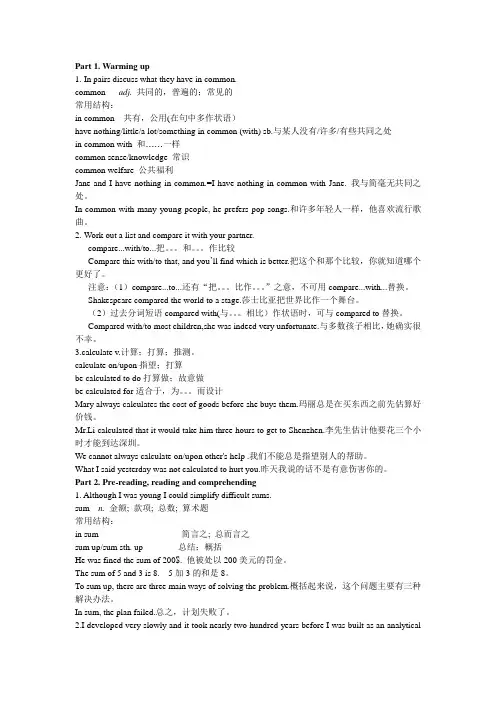
Part 1. Warming up1.In pairs discuss what they have in common.common adj.共同的,普遍的;常见的常用结构:in common 共有,公用(在句中多作状语)have nothing/little/a lot/something in common (with) sb.与某人没有/许多/有些共同之处in common with 和……一样common sense/knowledge 常识common welfare 公共福利Jane and I have nothing in common.=I have nothing in common with Jane. 我与简毫无共同之处。
In common with many young people, he prefers pop songs.和许多年轻人一样,他喜欢流行歌曲。
2.Work out a list and compare it with your partner.compare...with/to...把。
和。
作比较Compare this with/to that, and you’ll find which is better.把这个和那个比较,你就知道哪个更好了。
注意:(1)compare...to...还有“把。
比作。
”之意,不可用compare...with...替换。
Shakespeare compared the world to a stage.莎士比亚把世界比作一个舞台。
(2)过去分词短语compared with(与。
相比)作状语时,可与compared to替换。
Compared with/to most children,she was indeed very unfortunate.与多数孩子相比,她确实很不幸。
3.calculate v.calculate on/uponbe calculated to dobe calculated for适合于,为。
高一英语必修2第3单元短语知识点归纳和总结
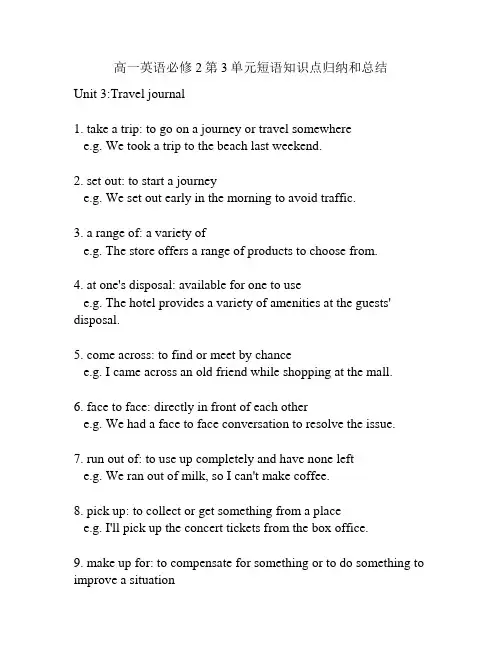
高一英语必修2第3单元短语知识点归纳和总结Unit 3:Travel journal1. take a trip: to go on a journey or travel somewheree.g. We took a trip to the beach last weekend.2. set out: to start a journeye.g. We set out early in the morning to avoid traffic.3. a range of: a variety ofe.g. The store offers a range of products to choose from.4. at one's disposal: available for one to usee.g. The hotel provides a variety of amenities at the guests' disposal.5. come across: to find or meet by chancee.g. I came across an old friend while shopping at the mall.6. face to face: directly in front of each othere.g. We had a face to face conversation to resolve the issue.7. run out of: to use up completely and have none lefte.g. We ran out of milk, so I can't make coffee.8. pick up: to collect or get something from a placee.g. I'll pick up the concert tickets from the box office.9. make up for: to compensate for something or to do something to improve a situatione.g. I'll bring you some chocolate to make up for forgetting your birthday.10. go off: to leave or depart, especially suddenly or unexpectedlye.g. They went off on a last-minute vacation.11. break down: to stop functioning or faile.g. My car broke down on the way to work.12. call off: to cancel or stope.g. They called off the meeting due to bad weather.13. set off: to start a journeye.g. We set off early in the morning to avoid traffic.14. end up: to finish or arrive at a certain place or situatione.g. We got lost and ended up in a different city.15. look out: to be careful or watchfule.g. Look out! There's a car coming.16. make use of: to use something effectively or take advantage of an opportunitye.g. I made use of the quiet time to catch up on reading.17. get in touch with: to contact someonee.g. I will get in touch with you as soon as I find out more information.18. make a decision: to choose or decide somethinge.g. It's difficult to make a decision without all the facts.19. check in: to register or report one's arrival at a hotel, airport, etc.e.g. We need to check in two hours before our flight.20. get around: to travel or move from one place to anothere.g. We rented bicycles to get around the city.21. keep up with: to stay updated or not fall behind in knowledge or understandinge.g. I read the news every day to keep up with current events.22. look forward to: to anticipate or feel excited about something in the futuree.g. I'm looking forward to going on vacation next week.23. run into: to meet or encounter unexpectedlye.g. I ran into my old teacher at the supermarket.24. go on: to continue or proceede.g. Let's go on with the meeting.25. drop off: to bring someone or something to a specific place and leave them or it theree.g. I'll drop you off at the train station on my way to work.26. catch up on: to do something that one has not had time for previouslye.g. I need to catch up on my homework this weekend.27. look up to: to admire or respect someonee.g. I look up to my parents for their hard work and dedication.28. turn up: to arrive or appear, especially unexpectedlye.g. He turned up at the party without an invitation.29. find out: to discover or obtain information about somethinge.g. I'll find out the answer and let you know.30. put off: to postpone or delaye.g. They put off the meeting until next week.These are just some of the key phrases from Unit 3: Travel journal in the textbook. Remember to practice using them in context so that you can utilize them naturally in conversations and writing.。
高一英语必修二unit3知识点总结
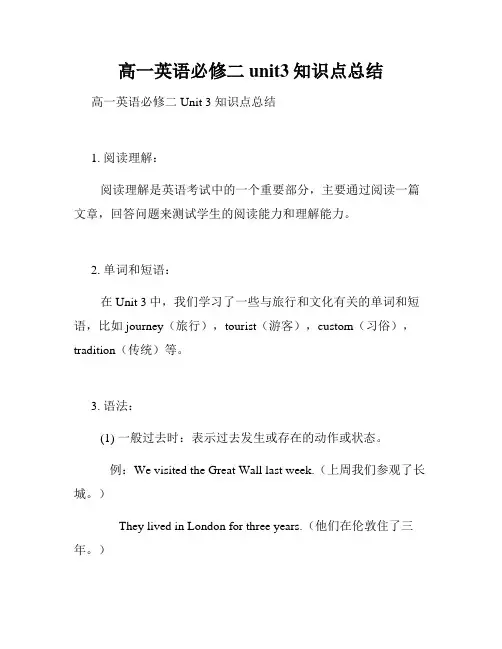
高一英语必修二unit3知识点总结高一英语必修二Unit 3 知识点总结1. 阅读理解:阅读理解是英语考试中的一个重要部分,主要通过阅读一篇文章,回答问题来测试学生的阅读能力和理解能力。
2. 单词和短语:在Unit 3中,我们学习了一些与旅行和文化有关的单词和短语,比如journey(旅行),tourist(游客),custom(习俗),tradition(传统)等。
3. 语法:(1) 一般过去时:表示过去发生或存在的动作或状态。
例:We visited the Great Wall last week.(上周我们参观了长城。
)They lived in London for three years.(他们在伦敦住了三年。
)(2) 定语从句:用来对主句中的名词或代词进行修饰的从句。
例:The book that he recommended is very interesting.(他推荐的那本书非常有趣。
)The boy whose mother is a doctor wants to be a doctor too.(那个妈妈是医生的男孩也想成为医生。
)(3) 物主代词:用来表示所属关系的代词。
例:This is my book, not yours.(这是我的书,不是你的。
)4. 句型转换:在学习英语中,我们常常需要进行句型的转换,比如从肯定句变为否定句,从陈述句变为疑问句等。
(1) 主动语态和被动语态的转换:例:They built the new stadium last year.(主动语态) The new stadium was built last year.(被动语态)(2) 肯定句和否定句的转换:例:He has finished his homework.(肯定句)He hasn't finished his homework.(否定句)(3) 陈述句和疑问句的转换:例:You have seen the film.(陈述句)Have you seen the film?(一般疑问句)5. 写作技巧:(1) 描述事物:在写作中,我们常常需要描述事物的外貌、特征或者能力。
人教版高中英语必修2unit3课文知识点详解
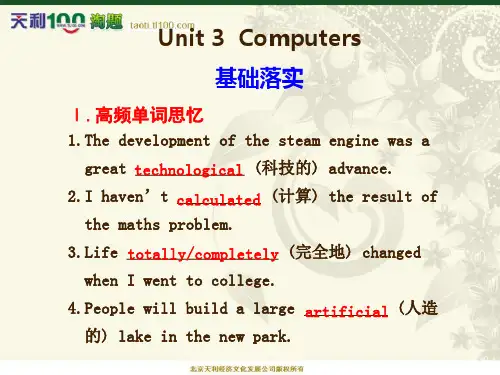
standing there?
9.“One World,One Dream” fully reflects the essence (实质) and the universal of the Olympic spirit. 10.The invention of the television caused a values
sign更侧重于区别性或指示性的标志。 (4)symbol指被人们选出的物体或图案,用来代表 另一事物,作为该事物的标记或象征。 The dove is the symbol of peace.
归纳总结
calculate v.计算;打算;推测。 calculate on/upon指望;打算 It is calculated that...据估算„„ be calculated to do打算做;故意做
be calculated for适合于
即学即用 (1)这些广告旨在吸引年轻的单身消费者。
when I went to college.
4.People will build a large artificial (人造 的) lake in the new park.
5.Before going to school,all the children are given an intelligence (智力) test. 6.Difficulties will arise as we do the work. 7.P ersonally ,I prefer to go to Beijing for my holiday. 8.Do you know that football coach who is
从„„中产生。
易混辨异
必修2Unit3重点汇总
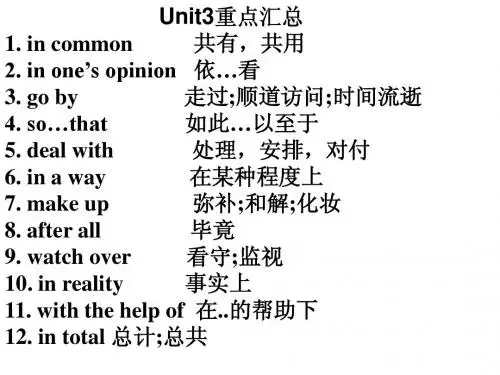
3.___________, As a result his father praised him for his progress. resulted in the death of a 4.The accident ___________ passenger. resulted from 5.The accident _______________ his carelessness. 3. in a way 在某种程度上 in the way 挡路;妨碍别人 all the way 一路;自始至终 in no way 决不 lead the way 带路 by the way 顺便说一下 make one’s way to 向…走去 on one’s way to 在去…的路上 (注意 on one’s way home)
4. deal with和do with 词义 处理;对 deal with 付;安排
用法 deal是不及物动词,常与 疑问副词 how 连用。
do with
处理;对 付
do为及物动词,常与疑问 动词 what 连用。
do with I wonder what they will ________the used car. with all the Children must learn how to deal ________ situations in their life. how I don’t know ______to deal with the situation. what I don’t know _______to do with the situation.
6. be of + 抽象名词 用法:(写作亮点) 在抽象名词 use, value, help, importance, difference 等前可用little, some, any, no, great, 等修饰;有的 可用同根形容词代替, be of +抽象名词=be +adj.如: be of value = be valuable be of importance = be important be of use= be useful be of great interest = be very interesting be of great help to sb. = be vey helpful of great importance What he said at the meeting was ___________________. (很重要) is of great help to us The lecture____________________. 这个演讲对我们很有帮助. There is no doubt that _________________________________. her advice is of great value to us 毫无疑问她的建议对我们很宝贵
高中英语人教版必修二Unit-3知识点汇总及强化练习
Unit 3 Computers 单元要点预览Ⅰ词语辨析Ⅱ词性变化Ⅲ重点词汇1. sum n. 金额; 款项; 总数; 总和[典例]1). He was fined the sum of 200. 他被处以200英镑罚金。
2). The sum of 5 and 3 is 8. 5加3的和是8。
[重点用法]in sum简言之; 总而言之sum sb/sth up形成对某人[某事物]的看法[练习] 中译英1). 总之, 计划告吹了。
______________________________________________________________________ 2). 我认为她是个很能干的经理。
______________________________________________________________________2. advantage n.优点;优势;有利条件[典例]1). He has the advantage of a steady job. 他有工作稳定的有利条件。
2). They took full advantage of the hotel's facilities. 他们充分利用旅馆的设备。
[重点用法]take advantage of 对……加以利用;欺骗to sb.’s advantage 对某人有利have /get/win an advantage over 〔of〕胜过;优于[练习] 中译英1).协议对我们有利。
______________________________________________________________________ 2).她利用了我的慷慨。
______________________________________________________________________3. goal n. 球门;进球得的分;目标[典例]1). He headed the ball into an open goal. 他乘虚把球顶入球门2). We won by three goals to one 以三比一获胜。
人教版高中英语必修2U3 Computers 知识要点归纳总结
Book II Unit Three Computers1.as a result 结果, 因此,表示原因和结果。
As a result he was given an excellent job.as a result of sth “由于…的原因”,其后跟名词后名词性短语,但不跟句子。
He was late asa result of the snow.2.so…that…如此……以至于……引导结果状语从句有以下结构: so + adj / adv thatso + many / few /much /little +名词thatThe house is so expensive that I can’t afford it.There are so many people that I can’t get in the bus.3. anyhow adv anyway 无论如何,不管怎样He told me not to buy it, but I bought it anyhow.It may be risky but we'll chance it anyhow.11.in a way 在某种程度上in some ways 在某些方面by the way顺便说说;顺便提一下all the way 自始至终;完全地I don’t like the house in a way.A bad thing can be changed into a good thing inaway.4.arise vi. 呈现; 出现; 发生During the night a great snow has arisen.A new difficulty has arisen.5.with the help of / with one’s help借助于,在…的帮助下The old walk with the help of walking sticks.With the teacher’s help, he made a rapid progress.6..deal with应付, 处理; 对待He have a great deal of problems to deal with.Be careful. She is very difficult to deal with.7.watch over 看守,监视watch out 注意;当心He used to be made to watch over sheep.Watch out ! A big dog is coming at you.8. from …on 从……时开始;从……时以后From then on he refused to talk about it.We must study even hard from now on.9. consist of =be made up of…由。
高一必修二英语unit3知识点
高一必修二英语unit3知识点Unit 3: Travel journalIntroduction:In the second year of high school, students are introduced to various important topics in English. One such topic is Unit 3, which focuses on exploring the theme of travel. This unit is crucial as it not only enhances language skills but also broadens students' horizons about different cultures and places around the world. In this article, we will delve into the key knowledge points covered within Unit 3.1. Vocabulary Expansion:A fundamental aspect of any language learning process is expanding one's vocabulary. Unit 3 provides students with an array of new words related to travel, such as "destination," "itinerary," "souvenir," and "accommodation." Familiarizing oneself with these terms can greatly improve communication skills when discussing travel experiences or planning trips.2. Grammar Focus: Modal Verbs:Unit 3 focuses on modal verbs, which play a prominent role in expressing different degrees of possibility, obligation, and ability. Some examples of modal verbs include "can," "could," "should," "must," and "might." Understanding these verbs helps students effectively convey their intentions or opinions, such as asking for permissions, making suggestions, or expressing doubts regarding travel plans.3. Reading Comprehension: Travel Stories:Unit 3 incorporates a variety of travel-related reading materials, enabling students to improve their reading comprehension skills. By analyzing travel stories and articles, students are exposed to different writing styles, cultures, and perspectives. This exposure not only helps develop linguistic abilities but also fosters a deeper appreciation for the world's diversity.4. Writing Skills: Trip Reports:Another crucial aspect covered in Unit 3 is the development of writing skills through trip reports. Students are encouraged to apply what they have learned by crafting detailed descriptions of their own or others' travel experiences. This exercise enhances their ability to organize information, convey emotions, and engage readers effectively.5. Listening and Speaking Practice: Dialogues and Conversations:Unit 3 offers ample opportunities for active listening and speaking practice. Dialogues and conversations about travel-related topics expose students to real-life language usage and help them improve their auditory comprehension and conversational skills. This practical application of language learning ensures students can communicate effectively in various travel-related situations.6. Cultural Awareness: Travel Etiquette and Customs:Unit 3 specifically emphasizes the cultural aspects of traveling. By exploring different cultures and examining travel etiquette and customs, students gain a deeper understanding and respect for diverse traditions and practices around the world. This knowledge enables them to interactrespectfully and confidently when encountering different cultural norms during their own travels.Conclusion:Unit 3 of the high school's second-year English curriculum is a comprehensive learning experience focused on travel-related topics. It equips students with essential vocabulary, vital grammar structures, and valuable reading, writing, listening, and speaking skills. Additionally, it nurtures cultural awareness and appreciation. Mastering the knowledge points in this unit not only contributes to students' overall proficiency in English but also prepares them for future travel experiences and intercultural encounters.。
高二英语必修二Unit3必背知识与学习方法
高二英语必修二Unit3必背知识与学习方法高二是高中学习的关键时期,不仅课程任务重,而且很大程度上打算着同学今后的进展方向,以及能否考入抱负的高校。
接下来我为大家整理了高二英语学习内容,一起来看看吧!高二英语必修二Unit3必背学问重点词汇、短语1. solve 解决;解答2. fromon 从...时起3. as a result 结果4. sothat 如此以至于5. explore 探究,探测,讨论6. anyhow 无论如何,即使如此7. goal 目标,球门,得分8. human race 人类9. signal 发信号,信号10. type 类型,打字11. in a way 在某种程度上12. arise 消失,发生13. with the help of 在...的关心下14. electronic 电子的15. deal with 处理16. watch over 看管,监视17. rise/arise/arouse/raise的区分重点句型1. certain和sure的句型sb. be sure/certain of= sb. be sure/certain that从句:某人确信be sure/certain to do sth. 确定会做Its certain that从句确定会Its certain that he will succeed.=Hes sure/certain to succeed.他确定会胜利的.Im sure/certain of his success.= Im sure/certain that he will succeed. 我确信他会胜利的2. 主语+ be + adj + to do The question is easy to answer.3. 状语从句的省略在when, while, if, unless, though, once等引导的状语从句中,假如从句的主语和主句的主语全都, 且从句中的谓语含有be动词时, 为了使句子简洁, 可省略从句中的主语和be动词。
- 1、下载文档前请自行甄别文档内容的完整性,平台不提供额外的编辑、内容补充、找答案等附加服务。
- 2、"仅部分预览"的文档,不可在线预览部分如存在完整性等问题,可反馈申请退款(可完整预览的文档不适用该条件!)。
- 3、如文档侵犯您的权益,请联系客服反馈,我们会尽快为您处理(人工客服工作时间:9:00-18:30)。
2watch 26. by 27. that 28. share 29. well 30. of 31. race 32. in 33. in 34. after 35. with 36. over3. from on4. from on5. as a of6. with the that7. result 8. result 9. solve a 10. reach a goal =11.be of great value= be very be of great use = be very be of great in terest = be ver 12. make the b est of =make the13. come 14. give (to sb.) 15. give 16. give doing sth. 17. in the way= in 18. in way 19. in way 20. by of 21. by the 22. with one help = with23. do with24. watch 25. out26. go27. so 28. sth. with sb. 29. as as 30. high quality 31. human 32. fact 33. a way34. all35. deal36. watch 1. com mon 2 .practice 3. now 4 1. have someth ing in2. comma n a goal = way _____ a goal be of no value= bebe of no use =be be of no in terest =beofofdeal with=take full of.the n 5. result 6. result 7. from 8. in 9. puzzle 10. obta in=achieve11. valuable valueless useful useless in teresti ng unin terest ing 12. most adva ntage 13. true 14. in15. out 16. up 17. one s18. this 19. no 20. way 21. way 22. the help 23. what how 24. for 25.二、课本知识点归纳和总结1. look after 照顾,照料=care for2. n eed=wa nt=require 需n eed doing =n eed to be done3. a good environment and safety 需要好的环境与安全4. as a result 结果5. endan gered 濒危的6. die out灭绝die off相继死去die of表示死的原因,die后既可接介词of,也可接from, 两者的区别是:一、若死因存在于人体之上或之内(主要指疾病、衰老等自身的原因),一般用介词of。
女口:die of illness (heart trouble, cancer, a fever, etc)死于疾病(心脏病,癌症,发烧等)二、若死因不是存在人体之内或之上,而是由环境造成的(主要指事故等方面的外部原因),一般用介词from。
女口:die from an earthquake (a traffic accident, a lightning, a stroke, etc)死于地震(交通事故,雷击等)三、若死因是环境影响到体内,即两方面共有的原因,则可用of, from 均可。
口:die of [from] a drink ( a wound, overwork, starvation, hunger and cold, etc)死于饮酒(受伤,劳累过度,饥饿,饥寒等)但是在实际运用中,两者混用的情况较多。
7. a report on sth 一个关于 .. 的报告8. too much 后加名词,much too 后加adj 或adv. too much dust 太多灰尘9. remai n to be see n 有待于拭目以待10. in peace处于和平状态没有in the peace,没有in peace of这样的表达11. kn ow of = know about 知道了解12. in danger of 面临危险13. had always Ion ged to do sth. always 总是,这是完成时的标志。
by + 时间,si nee 都是完成时的标志。
14. wake up 睡醒15. a flying carpet 一个飞毯16. take sb. to sp.带某人去某地17. at once立刻,马上18. fly away 飞走了19. see an an telope look ing sad see sb. doing sth.看至U某人正在做某事20. make sweaters 制作毛衣21. so ...... t hat如此.... 以至于22. next minute用作连词,表示转眼间23. turn around 转身24. take my photo 照相25. in relief如释重负,松了口气26. burst into laughter 突然大笑起来27. used to do sth.通常干某事英语28. without mercy 毫无仁慈have mercy on sb.对某人又仁慈之心29. only a certai n number of sth. 只有少数的某物only+单个主语不倒装,only + 状语或状语从句放于句首时,倒装主语,不倒装从句。
30. suggest 一是表"建议”,二是表"表明” 。
suggest doing建议干某事表建议:可接that宾语从句,that从句用should+动词原形,should可以省略.She suggested that the class meeti ng (should) not be held on Saturday.II II1)The simple house suggested a modest in come.Her pale face suggested bad health. ,The thought of summer suggests swim ming.31. n ews a piece of n ews32. protect sb. from sth.protect sb. from doing sth.preve nt sb. from doing sth= stop sb. from doing sth.33. mosquitoes +es34. over my body35. affect=have an effect on36. pay more atte nti on to37. appreciate doing sth. I appreciate it if38. no rain forest, no ani mals, no drugs.39. disappear40. do harm to sth. be harmful to sth.41. sell well has sold very well42. go dow n to43. tens of thousa nds of44. come into being45. a nu mber of46. not o nly but also47. in such a short time it=keep sb. from doing sth.to.48. accord ing to49. some reas on50. survive sth. =a certa in reas onsurvive the earthquake, accide nt, rainstormOn ce, lately at ni ght, an En glishma n came out of his room into a passage of the hotel and ask the servant to bring her a glass of water. The servant did like he was asked. The Englishman returned his room, and a few mi nu tes later he came into the passage aga in and once more asked the serva nt a glass of water. Every a few mi nu tes the En glishma n would come out of his room and repeated his request. After half an hour the ast onishing serva nt decided to ask the man what he was doing with the water. "Noth in g," an swered him calmly. "It's simply that the room is on fire.英语The most widespread fallacy (谬论)of all is that colds are caused by cold. They are not. They are caused by viruses pass ing on from pers on to pers on. You catch a cold by coming into con tact, directly or in directly, with some one who already has on e. If cold causes colds, it would be reas on able to expect the Eskimos to suffer from them forever. But they do not. And in isolated arctic regi ons explorers have reported people are free from colds un til they come into con tact aga in with in fected people from the outside world by way of packages and mails dropped from airpla nes.During the First World War soldiers who spent long periods in the trenches (战壕),cold and wet, showed no in creased tendency to catch colds.In the Second World War pris oners at the Auschwitz concen tratio n camp, n aked and starvi ng, wereast oni shed to find that they seldom had colds. At the Com mon Cold Research Unit in En gla nd, volun teers took part in experime nts in which they gave themselves to the discomforts of being cold and wet for long stretches of time. After tak ing hot baths, they put on bath ing suits, allowed themselves to be with cold water, and the n stood about dripp ing wet in a drafty (通风良好的)room. Some wore wet socks all day while others exercised in the rain until close to exhaustio n. Not one of the volun teers came dow n with a cold uni ess a cold virus was actually dropped in his no se.If, the n, cold and wet have nothing to do with catch ing colds, why are they more freque nt in the win ter ? Despite the most pain s-tak ing research, no one has yet found the an swer. One expla nati on offered by scie ntists is that people tend to stay together in doors more in cold weather than at other times, and this makes it easier for cold viruses to be passed on.31. The writer offered ______ examples to support his argume nt.A. 4B. 5C. 6D. 732. Which of the followi ng is TRUE accord ing to the passage?A. The Eskimos suffer from colds from time to time.B. Colds are not always caused by cold.C. People suffer from colds just because they like to stay in doors.D. A pers on may catch a cold by touch ing some one who already has one.33. Arctic explorers may catch colds whe n they are _____ .A. worki ng in the isolated arctic regi onsB. writi ng reports in terribly cold weatherC. free from work in the isolated arctic regi onsD. coming into touch aga in with the outside world34. Volun teers tak ing part in the experime nts in the Com mon Cold Research Un it ___ .A. suffered a lotB. n ever caught coldsC. ofte n caught coldsD. became very strong35. The passage mainly discusses ______ .A. the experime nts on the com mon coldB. the fallacy about the com mon coldC. the reas on and the way people catch coldsD. the continued spread of com mon colds通知1假如你校学生会(Students ' Un)要举办一次英语演讲比赛(contest),请你用英语写一篇书面通知,以便张贴到布告栏上。
